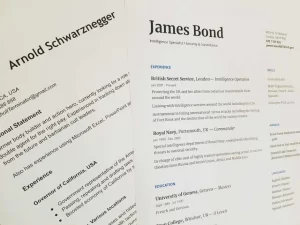Imagine yourself sitting in an interview, and the recruiter asks, “Tell me about a time you led a team through a challenging situation.” This isn’t just small talk—it’s competency-based interview questions, designed to evaluate how your past experiences and skills align with the role you’re applying for. To excel, you need more than generic answers; you need compelling, well-structured responses that vouch for your capabilities.
In this guide, we’ll explore what competency-based interview questions are, why they matter to employers, and how you can prepare to ace them. Whether you’re a seasoned professional or starting your career, these insights will help you confidently tackle this essential part of the hiring process.
What are Competency-Based Interview Questions?
Competency-based interview questions focus on assessing specific skills and behaviors relevant to the job. They require candidates to provide real-life examples of how they’ve demonstrated competencies such as teamwork, problem-solving, or leadership. For example, instead of asking, “What are your strengths?” you might hear, “Can you describe a situation where you resolved a conflict in the workplace?”
Unlike traditional interview questions, which are often hypothetical or general, competency-based questions dig deeper. They allow hiring managers to evaluate your ability to navigate real-world scenarios, ensuring you’re equipped to succeed in the role.
Why Competency-Based Interviews Matter for Employers
Competency-based interviews provide employers with valuable insights into a candidate’s ability to meet job demands. By asking about specific experiences, hiring managers can assess key competencies like leadership skills, time management, and adaptability.
Additionally, these interviews help determine cultural fit by evaluating how candidates have applied their skills in a team-oriented or high-pressure work environment. For employers, this structured approach ensures they make informed hiring decisions based on practical, evidence-based assessments.

Why is it Important to Prepare for Competency-Based Interviews?
Competency-based interviews require more than off-the-cuff responses; preparation is key to making a lasting impression. Otherwise, you risk giving vague answers that fail to showcase your strengths.
- Demonstrate Your Expertise: Preparation helps you connect your skills to the job description, proving you’re a strong candidate.
- Craft Strong Responses: Thinking through your past achievements in advance ensures your answers are clear and impactful.
- Leave a Memorable Impression: Well-prepared candidates are more likely to impress hiring managers with detailed, thoughtful examples.
- Boost Confidence: Knowing what to expect reduces anxiety and allows you to focus on presenting your best self.
- Highlight Key Competencies: Finally, being prepared ensures you address the skills most relevant to the role, improving your chances of success.
Related Article:
Common Competency-Based Interview Questions You Should Know
Competency-based interview questions allow employers to evaluate your abilities by diving into your past experiences and behaviors. Below, we’ve listed 15 common competency-based questions, along with suggested answers for each to help you prepare effectively:
1. Can you describe a time when you solved a problem under pressure?
Sample Answer: “During a project deadline crunch, we discovered a major data error that could have delayed the launch. I quickly gathered the team, identified the issue, and reallocated tasks to fix it within hours. By staying calm and focused, we not only met the deadline but also improved our data review process to avoid future errors.”
2. Tell me about a project you managed successfully.
Sample Answer: “I led a six-month marketing campaign with a cross-functional team of designers, writers, and analysts. I ensured clear communication, set milestones, and resolved conflicts to keep us on track. The campaign resulted in a 20% increase in leads, exceeding our initial goal.”
3. Describe a situation where you showed leadership skills.
Sample Answer: “When our team leader was unexpectedly out, I stepped up to coordinate a high-stakes presentation. I assigned tasks, checked progress, and delivered the presentation myself. The client was impressed, and we secured the contract.”
4. How do you handle conflicts in the workplace?
Sample Answer: “During a team disagreement over priorities, I facilitated a meeting to listen to everyone’s concerns. By finding common ground and proposing a compromise, we aligned our efforts. This approach not only resolved the conflict but also improved team morale.”
5. Give an example of a time you adapted to a major change at work.
Sample Answer: “When our company shifted to remote work, I quickly adapted by learning new collaboration tools. I also helped train colleagues to ease the transition. As a result, our team maintained productivity and cohesion during the adjustment period.”
6. Can you share a time when you worked as part of a team to achieve a goal?
Sample Answer: “During a product launch, I collaborated with a team of developers and marketers to ensure everything went smoothly. My role involved coordinating timelines and ensuring alignment between departments. Together, we delivered the product on time, which exceeded our sales expectations by 15%.”
7. Describe an instance when you had to meet a tight deadline.
Sample Answer: “While working on a last-minute client request, I had only two days to prepare a detailed report. I focused on prioritizing key deliverables and delegated less critical tasks to teammates. By staying organized, I completed the report on time, and the client was extremely satisfied with the results.”
8. How do you prioritize tasks when managing multiple responsibilities?
Sample Answer: “When faced with competing priorities, I use a combination of task lists and deadline tracking to stay on top of my responsibilities. For example, during a busy quarter, I divided my workload into urgent and important categories, completing high-priority tasks first. This approach ensured I met all deadlines without compromising quality.”
9. Tell me about a time you improved a process or system at work.
Sample Answer: “I noticed inefficiencies in our team’s reporting process, which required hours of manual data entry. I proposed and implemented an automated solution using software tools, cutting the process time by 50%. This allowed the team to focus on more strategic initiatives and reduced errors significantly.”
10. Describe a situation where you exceeded expectations.
Sample Answer: “In my previous role, I was asked to increase website traffic by 10% over three months. By implementing targeted marketing strategies and optimizing SEO, I achieved a 25% increase in just two months. My manager recognized my efforts, and I was given additional responsibilities in digital strategy.”
11. How do you handle constructive criticism?
Sample Answer: “When I received feedback about my presentation style being too detailed, I took it as an opportunity to improve. I attended a workshop on concise communication and practiced delivering clearer presentations. As a result, my next presentation was more focused and received positive feedback from both colleagues and leadership.”
12. Can you give an example of how you ensured quality in a task or project?
Sample Answer: “While managing a marketing campaign, I implemented a thorough review process for all deliverables. This included regular check-ins and quality checks to ensure alignment with client expectations. The campaign launched flawlessly, earning praise from the client for its professionalism.”
13. Tell me about a time you collaborated with someone difficult to work with.
Sample Answer: “I worked with a colleague who often missed deadlines due to differing work styles. I initiated open communication to understand their challenges and adjusted timelines to accommodate their needs without compromising the project. This improved our collaboration, and we successfully delivered the project on time.”
14. Describe how you’ve demonstrated cultural fit in a previous role.
Sample Answer: “In a multicultural team, I actively participated in group activities and respected diverse perspectives. I also adjusted my communication style to ensure inclusivity. This helped build strong relationships and fostered a positive work environment.”
15. Share an experience where you achieved a challenging goal.
Sample Answer: “I was tasked with increasing our client retention rate by 10% in six months. I analyzed client feedback, introduced a new onboarding process, and implemented regular check-ins to address concerns. These changes resulted in a 15% increase in client retention within the given timeline.”

Essential Tips to Ace Competency-Based Interview Questions
Competency-based interviews can feel daunting, but the right strategies will set you up for success. Here are essential tips to help you stand out:
1. Master the STAR Technique
Structure your answers using Situation, Task, Action, and Result to ensure clarity and focus. This approach helps you present your achievements effectively.
2. Align Answers with Key Competencies
Research the job description to identify critical skills and ensure your examples highlight those strengths.
3. Practice Real Scenarios
Rehearse answers to common competency-based questions using your own experiences. This makes your responses more authentic.
4. Be Specific and Measurable
Include quantifiable outcomes to demonstrate the impact of your actions, like increased revenue or improved efficiency.
5. Stay Positive
Frame challenges as opportunities to showcase growth and adaptability, leaving a favorable impression on hiring managers.

Land Your Dream Role with a Job-Winning Resume
Preparing for competency-based interview questions is just one step toward landing your dream job. While mastering these questions gives you a competitive edge, presenting yourself with a professional, polished resume is equally critical. Your resume is often the first impression you make, and it needs to showcase your skills, accomplishments, and key competencies in a way that aligns with your target role.
Let a team of expert resume writers help you stand out. With tailored, industry-specific resume writing services, you can confidently highlight your achievements and position yourself as the perfect fit for your desired role. Whether you’re just starting your job search or looking to elevate your career, a professionally crafted resume will make all the difference.








